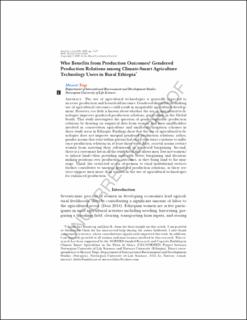| dc.contributor.author | Abebe, Meseret Tsige | |
| dc.date.accessioned | 2021-04-23T08:54:42Z | |
| dc.date.available | 2021-04-23T08:54:42Z | |
| dc.date.created | 2019-04-12T10:13:15Z | |
| dc.date.issued | 2019 | |
| dc.identifier.citation | Rural Sociology. 2019, 84 (4), 799-825. | en_US |
| dc.identifier.issn | 0036-0112 | |
| dc.identifier.uri | https://hdl.handle.net/11250/2739289 | |
| dc.description.abstract | The use of agricultural technologies is generally expected to increase production and household incomes. Gendered disparities in making use of agricultural outcomes could result in inequitable agricultural develop-ment. However, too little is known about whether the use of agricultural tech-nologies improves gendered production relations, particularly in the Global South. This study investigates the question of gender-equitable production relations by drawing on empirical data from women and men smallholders involved in conservation agriculture and small-scale irrigation schemes in three study areas in Ethiopia. Findings show that the use of agricultural tech-nologies does not improve unequal gendered production relations; rather, gender norms that exist within patriarchal social structures continue to influ-ence production relations in at least three ways. First, societal norms restrict women from asserting their self-interest in gendered bargaining. Second, there is a customary law in all the study areas that allows men (but not women) to inherit land—thus providing men with better bargaining and decision-making positions over production outcomes, as they bring land to the mar-riage. Third, the restricted access of women to rural institutional services further contributes to unequal gendered production relations, as these ser-vices support men more than women in the use of agricultural technologies for enhanced production. | en_US |
| dc.language.iso | eng | en_US |
| dc.rights | Attribution-NonCommercial-NoDerivatives 4.0 Internasjonal | * |
| dc.rights.uri | http://creativecommons.org/licenses/by-nc-nd/4.0/deed.no | * |
| dc.title | Who Benefits from Production Outcomes? Gendered Production Relations among Climate-Smart Agriculture Technology Users in Rural Ethiopia | en_US |
| dc.type | Peer reviewed | en_US |
| dc.type | Journal article | en_US |
| dc.description.version | acceptedVersion | en_US |
| dc.source.pagenumber | 799-825 | en_US |
| dc.source.volume | 84 | en_US |
| dc.source.journal | Rural Sociology | en_US |
| dc.source.issue | 4 | en_US |
| dc.identifier.doi | 10.1111/ruso.12263 | |
| dc.identifier.cristin | 1691875 | |
| dc.relation.project | NORHED: Research and Capacity Building in Climate Smart Agriculture | en_US |
| cristin.unitcode | 192,13,1,0 | |
| cristin.unitname | Institutt for internasjonale miljø- og utviklingsstudier | |
| cristin.ispublished | true | |
| cristin.fulltext | postprint | |
| cristin.qualitycode | 1 | |

